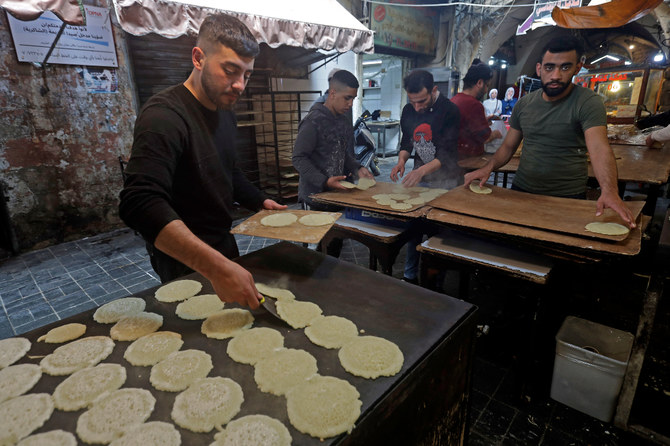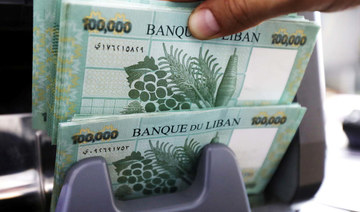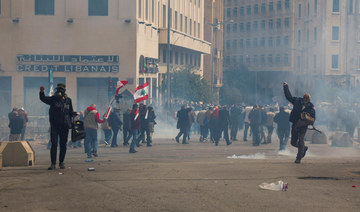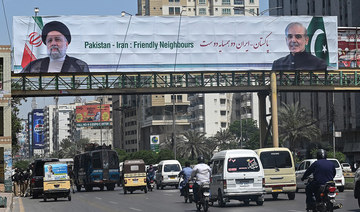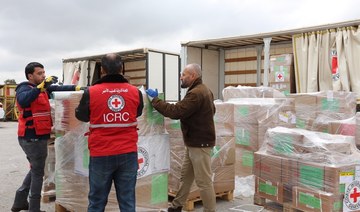BEIRUT: The streets of Beirut have been modestly decorated for Ramadan, reflecting the austere measures adopted by Lebanon’s Islamic associations and authorities amid the country’s worsening economic crisis.
Beirut Gov. Marwan Abboud said: “In an attempt to spread joy during the month of Ramadan, the cost of decoration and electricity for lights was covered by donors who provided solar power panels for the electricity polls due to the difficulties we are facing.”
The price of food, vegetables and meat skyrocketed a month before Ramadan as the country’s currency plunged against the dollar, forcing families to look for alternatives and less expensive goods.
Unemployment rates are rising amid the rapid financial collapse, while the UN Economic and Social Commission for Western Asia estimates that up to 82 percent of the population is facing poverty.
Fattoush salad, a staple iftar item during Ramadan, now costs around 225,000 Lebanese pounds ($14.99) compared with 4,250 Lebanese pounds two years ago.
Rami Ghalayini, owner of a Beirut juice shop, said that a bottle of juice remains essential during Ramadan meals after a long day of fasting. However, a one-liter bottle of fresh orange juice now costs more than 100,000 Lebanese pounds, three times the price last year.
Despite the rapidly rising cost of essential items, employees continue to receive salaries based on the old exchange rate of 1,507 Lebanese pounds to the dollar.
Jad, who works at a cooperative, said: “My wife and I do not know if we will be able to provide a daily dish. The prices of food items are increasing by the minute. They are being priced based on an exchange rate higher than that of the black market, while our salaries remain the same and their value decreases.
“I have to think of other essentials that need to be paid, such as the electricity generator bill, water, and medication if one of my children needs it.”
Fatima, a housewife, said that she used to welcome Ramadan by decorating the house, and buying luxury dates, walnuts, almonds and raisins.
“But this year, I find myself unable to buy these non-essential snacks. I even need some help, as my husband’s and son’s salaries are no longer enough to pay for the food. These are some of the hardest days we have had to endure, but, God willing, we will be able to fast and provide iftar meals as best as we can.”
Nada Bakkar is carefully using her husband’s meager salary to buy goods and supplies for Ramadan.
Bakkar said that she spent more than 5 million Lebanese pounds buying basics, such as rice, oil, herbs and sugar.
“I have not bought meat, chicken and dairy products yet, and their prices have surged to record levels,” she added.
“The merchants are messing with the prices with nobody there to monitor them. I am very worried that I might not be able to provide enough food to feed my family and prepare a main dish every day.”
People are trying to remain optimistic. Nada Katoua believes that “Ramadan comes with blessings. I know people’s incomes have decreased and many families are no longer able to secure their daily bread. However, we should always welcome the month of goodness with hope.”
Last year, the Lebanese Ministry of Social Affairs launched the “Aman” program to support the poorest 150,000 Lebanese families. However, the scheme, which relied on a $246 million World Bank loan, has yet to be fully implemented.
The ministry is waiting to receive a $300 million World Bank loan to “support the groups facing unprecedented levels of poverty,” according to Farid Belhaj, World Bank vice president for the Middle East and North Africa.
The Sidon Merchants Association set up decorations in the city’s commercial markets, which are popular with people from various regions during Ramadan.
Ali Al-Sharif, the association’s head, said: “We want to give people a glimmer of hope, as the month of Ramadan arrives amid a worsening economic crisis, the repercussions of which are directly affecting everyone.
“Basic government services are continuing to deteriorate and people’s businesses are at a halt. Expats are the only ones providing this country with some sort of lifeline, thanks to the money they are transferring to their families to ensure their survival.”



